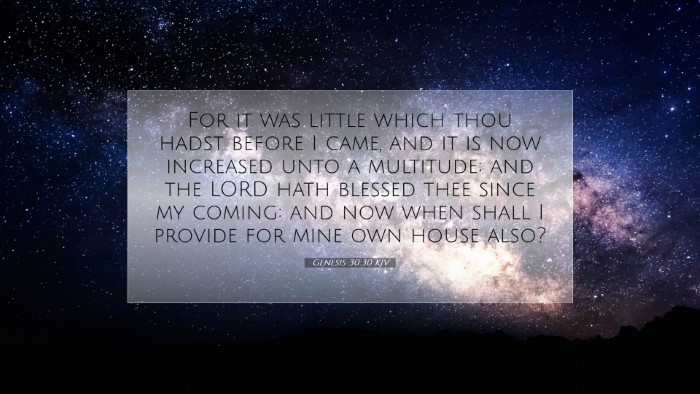Commentary on Genesis 30:30
Genesis 30:30 states: "For it was little which thou hadst before I came, and it is now increased unto a multitude; and the LORD hath blessed thee since my coming: and now when shall I provide for mine own house also?" This verse encapsulates profound themes of divine providence, stewardship, and the covenantal relationship between man and God.
Contextual Background
The narrative of Genesis 30 occurs during the tumultuous relationship between Jacob, Rachel, and Leah, and details the struggles of Jacob in the house of Laban. Jacob seeks to negotiate fair remuneration for his labor, underscoring the tension between his personal welfare and his obligations to Laban.
The Divine Blessing and Human Labor
Matthew Henry comments on the idea that Jacob acknowledges the stability and prosperity brought about through God's blessing. Despite the laborious efforts attributed to Jacob’s shepherding skills, it is the LORD's providence that ensures Laban’s wealth increases during Jacob's tenure.
- Divine Favor: Jacob emphasizes the divine origin of Laban's success, recognizing that it was the LORD who caused this growth.
- Stewardship and Responsibility: In admitting God's providence, Jacob places before Laban the ethical demand of providing for his own family, highlighting the need for stewardship that encompasses both divine blessings and personal responsibility.
Theological Implications
From a theological perspective, Adam Clarke highlights the significance of God's continuous involvement in the workings of human affairs. Jacob's statement reveals the recurring scriptural motif that God blesses His people in their labor as part of the covenant promise made to Abraham, Isaac, and Jacob.
- Covenantal Blessings: Jacob's acknowledgement stresses that God’s blessings often accompany faithful service, emphasizing a righteous return on labor invested in accordance with divine will.
- Human Agency: While divine intervention is paramount, the verse reflects the reality of human agency and diligence. Jacob’s work serves as a reminder of the requisite effort in the midst of divine blessings.
Application for the Believer
In light of this commentary, several applications emerge for pastors, students, and theologians:
- Faith in God's Providence: Believers are encouraged to trust in God’s providential dealings in their lives and ministries. Just as Jacob recognized God’s hand in Laban’s prosperity, Christians should remain aware of God’s blessings amidst their labor.
- Understanding Work as Worship: Jacob's narrative invites believers to view their daily work not merely as a means of income, but as an act of worship reflecting their commitment to God.
- Importance of Equity in Labor: The dialogue reinforces the need for equity in professional relationships. Just as Jacob sought a fair provision for his household, so too should believers advocate for fairness and justice in their workplaces.
Conclusion
Genesis 30:30 serves as a rich text illustrating the intersection of divine blessing and human endeavor. Through the insights gleaned from public domain commentaries by esteemed scholars such as Matthew Henry, Albert Barnes, and Adam Clarke, it becomes evident that God’s involvement in our labor is both a gift and a call to responsibility. Thus, this scripture challenges believers to engage in their endeavors with a profound awareness of God’s sovereign hand while committing to responsible stewardship over their own families and communities.


